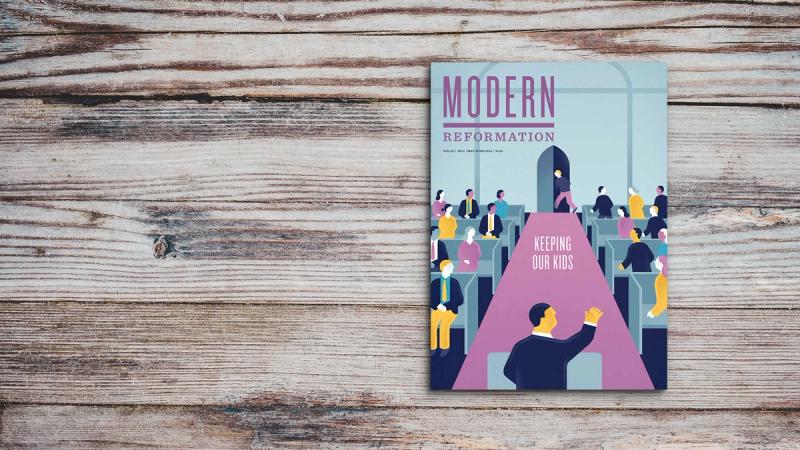I was raised in a Jewish home without a lot of theology. Okay, to be honest, without any theology really. My father never read or discussed the Bible at home, and he was downright hostile to those who were foolish enough to knock on our door spreading their religious views. There was simply no excuse for that sort of thing. It was just wrong! Why it was wrong we were never told.
I was the first to formally abandon ship when I converted to the Christian faith at age eighteen, but in reality I had checked out of Judaism long before that. I can remember being an atheist in the fourth grade, even while I was attending Hebrew school. The true miracle, I had surmised, wasn’t that Moses parted the Red Sea, but that he got so many people throughout the world to actually believe all his made-up stories.
I’m not sure when my brother ended up checking out. During the first few years of life on his own, he at least made an effort to date only Jewish girls, but he eventually settled down with a nonpracticing Catholic and had two daughters. Early on, he and his wife tried celebrating both Hanukkah and Christmas, but the flames of the menorah eventually burned out, along with all remaining vestiges of his own Jewish identity.
My parents lost their faith somewhere across the decades. My mother’s beliefs were never classically Jewish, but rather an amalgam of American spirituality, reincarnation, and positive thinking. Still, she used to believe in God and now no longer does. My father’s faith was never a deep well, and somewhere along the line it simply dried up. He cannot explain when or why, but like my mother, he’s now agnostic about religious questions and assertions, especially the latter.
Of course, my family’s story is not in any way unique. Just change some of the labels and circumstances around a bit and you’ll discover a familiar and recurring pattern that affects religious adherents of every variety. The fact is that if we are not intentional about our faith, we will all be assimilated into the beliefs, values, and assumptions of our surrounding culture. If not today, perhaps tomorrow or twenty years down the road. But it will happen.
The problem is that most of us think of contemporary American culture as the neutral playing field of our lives. But in reality, we live in a place like New Delhi. Think about that as a real possibility for a moment. If you were called to move your family overseas to a Hindu culture, you would likely begin to feel the regular and steady pressure to conform to the values and assumptions of that particular culture the more time you spent there. Since lack of conformity creates controversy, conflict, and sometimes alienation, it would take a certain amount of resolve, rooted in deeply held convictions, to keep you from taking the easy way out if you were to stay in that culture for an extended period.
Think also about how difficult such a transition would be on your children. A first grader might not understand the implications of being asked to pray to other gods while visiting the homes of his friends; so as a parent, you would have to be much more intentional in terms of teaching your child about the kinds of ideas and practices he should accept or reject and, more importantly, why he should accept or reject them.
In former days this sort of thing was done formally in a process we all refer to as catechism. The child would memorize questions and answers that would serve to summarize the main tenents of faith, and the child would then need to recite this material during a period of confirmation. My wife was raised in a Lutheran context, and this process was part of her religious instruction growing up. I went through a similar process in my Jewish upbringing as I studied the Hebrew language and memorized portions of the Old Testament in preparation for my bar mitzvah, at which time I was called to read from the Torah and recite various prayers from the pulpit – at age thirteen!
It’s amazing to me how different the world is now from the way it was then. It was essentially an adult world, and children were called to grow up into it. We had responsibilities and duties associated with our faith. Today, we’re all aware of fun and exciting youth groups, but how many of us impose formal religious duties on our children, such as requiring them to memorize Scripture or catechism questions? I believe that far too many of us, myself included, have been so influenced by the pervasive “child-centeredness” of our times that we’ve ended up placing far fewer demands on our children when compared with previous generations. Combine this with a general distaste for rote memorization, and you have a recipe for the sort of biblical and theological illiteracy we’re currently witnessing among today’s religious teens.
But, of course, recovering these types of “antiquated” duties is not a one-size-fits-all solution, and I believe this is a mistake many Christians in the Reformation tradition frequently make. My wife will be the first to tell you that her catechism experience was less than complete. Though it truly helped her to understand the theology of Lutheranism, it was seriously deficient in explaining how that theology related to just about anything else. Even as a child she was aware of other denominations and non-Christian religions, but she was never shown how Lutheranism “got it right” when compared with these other perspectives. In other words, she was told what to believe, but rarely, if ever, why to believe it.
My experience was similar to this. For many years I was forced to go to Hebrew school two or three times a week, and this after I had already spent the morning and afternoon in public school. During this period I learned a great deal about Hebrew verbs and the traditions of Judaism, but I was never given a rationale for why any of this was important or true. As a result, even while I was in their midst, I had already checked out.
In my own case, an obvious problem was the fact that the topic of religion wasn’t something that ever really came up in our family. So while my brother and I had religious duties, we didn’t really have a “religious life.” Synagogue or Hebrew school was the place for that. And this, I fear, is a problem that affects many contemporary Christian families as well. In short, religion has been compartmentalized to a few hours on Sunday, and religious instruction has been outsourced to the youth pastor or Sunday school teacher. In her book Almost Christian, Kenda Creasy Dean referred to Martin Luther’s Small Catechism as an “educational stroke of genius,” because she said it “located teaching out loud in households, not congregations, which had the effect of locating Christian formation in the intimacy of families, where children drew direct connections between religious instruction at the dinner table and the lives of people that loved them.” The simple fact of the matter is that parents are the most formative influence on the life of any child, and if they are not going to be involved in passing on the faith, it’s more likely that their faith will be “passed by.”
So, though I believe parents need to take a more formal role in the religious formation of their children, there’s something else I believe is even more important in our time: Christian parents themselves need to be so deeply rooted in their faith that they can regularly make use of informal opportunities to talk about crucial topics such as who God is and the difference between things like truth and opinion. We need to be able to contrast the Christian worldview with an opposing perspective that we watch in a film or listen to in the lyrics of a song. I believe we should ask our kids provocative “catechetical” questions such as, “What do you think was the basic message of that commercial we just watched, and how do you think it was trying to persuade you?”, along with an occasional, “What Bible passages come to mind when you think of this issue?”
If you really want to push the envelope, you can even begin asking your kids (if they’re old enough) tough questions they’re likely to get later on in life, such as, “How do you know this is true, since there are a lot of people who have a set of beliefs different from yours?” Or, “Why should I trust the Bible?” In doing so, you’ll be preparing your kids to articulate answers that may be useful, not only as they interact with others, but also for doubts that may arise in their own hearts sometime down the road. You’ll also be communicating to them that your faith is serious and that it speaks to everything in life. Finally, you’ll be doing it all in a way that’s relevant, since you’ll be addressing issues that come up naturally throughout the course of everyday life. But remember: in order to do any of this well, you need to “always be ready to give an answer to the one who asks, to give a reason for the hope that is in you” (1 Pet. 3:15).





